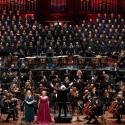You never quite know whether a new work by James MacMillan is going to veer towards the masterly or the overblown. His magnificent chain of concertos has arguably yielded masterpieces, but the Third Symphony at the Proms in 2003 sounded like an unwieldy impersonation of the monumental. Twelve years have passed, and he’s shied off writing a Fourth until he felt he had something to say. And while this most worthwhile of the BBC commissions may have its moments of excessive rhetoric – so, too, does the second movement of Mahler’s Fifth, also on the programme – it measures up to its ambition, as well as the evening’s larger-scale companion-piece, very well indeed.
A near-collage of different musics – the composer calls them archetypal “rituals of movement, exhortation, petition and joy" – sounds at times like a nod in the direction of Tippett’s mosaical symphonic construction, and a rapturous passage for multi-part strings towards the beginning, Sibelius-style, recurring towards the end, also has something of Tippett-style ecstasy about it. But there are also the familiar MacMillan thumbprints, the bending, keening between intervals and the evocation of chant from the past. This time it’s the music of fellow Scot Robert Carver, his 10-part mass Dum sacrum mysterium moving from the background of evocative rear-desk lower strings to a higher profile.
Mark O’Keeffe’s opening fanfare told us this was going to be a sometimes spacious and always commanding account of the symphonyThe most fascinating sounds in the work are in the two passages of layered chatter with eerie rolls for percussion, Chinese gongs and ((I think) steel pan included. Even sequences which veer towards sentimentality or the sense of using large forces just because they’re there quickly take an original turn, and the final eruption made an apocalyptic impact in the spaces of the Albert Hall, well suited to the symphony's cosmic reaches. Full marks to Linda Cochrane, setting a disinctive seal on the often startling piano part, but above all to Donald Runnicles, whose significant birthday played a significant part in inspiring the symphony, and whose underlying dynamic pulse was as impressive as Susanna Mälkki’s a week ago.
Runnicles is one of the world's best masters of the late romantic repertoire, and he should know by now how to get the best results from his extraordinarily fine BBC Scottish Symphony Orchestra. Last year's Mahler Ninth Symphony, also coincidentally a Prom 24, was well shaped and sonically underpowered, but things have moved on since then. From where I was sitting, the strings still need a last degree of muscle in the daunting role that composer's Fifth asks of them in brass-dominated ensembles. Yet in the ever more inward statements of the opening funeral march and the noble spread of the Adagietto they were as fine as any orchestral department. Runnicles has worked on every detail of articulation – the bustling fugues of the finale were filled with vitality in every bar – and his romantic rubato now frees him up to career nearly over the edge, with thrilling results in the pivotal scherzo.
There was even a connection between that experimental movement’s twilight zones and the surprising introspection – unique in my experience – he found between the symphony’s last two pell-mell celebrations. Richard Watkins’ obbligato horn and above all Mark O’Keeffe’s trumpet, resonating unaccompanied into the hall with an opening fanfare which told us this was going to be a sometimes spacious and always commanding account of the work. Runnicles may be handing over the Chief Conductor’s baton soon to Thomas Dausgaard, but that shouldn’t be too much of a disappointment given Dausgaard’s credentials, which you can hear put to the test when the orchestra returns to launch the Proms’ Sibelius symphonies cycle on 15 August.
- Listen to this Prom for the next month on the BBC iPlayer
- David Nice's blog on Runnicles' Sibelius with the BBCSSO in Inverness
Read theartsdesk's reviews of other concerts from the BBC Proms














Add comment